
| Next | Previous | Index | Tellout Home |
62. Seven Roman Emperors
Revelation 17.9-14
"This calls for a wise mind. The seven heads are seven hills on which the woman sits. They are also seven kings. Five have fallen. One is, the other has not yet come. He must remain for a little while until he comes. The beast who once was, and now is not, is an eighth king. He belongs to the seven and is going to his destruction. The ten horns you saw are ten kings who have not yet received a kingdom but who will receive kings' authority along with the beast for one hour. They have one purpose and will give the beast their power and authority. They will wage war against the Lamb, but the Lamb will triumph over them because he is Lord of Lords and King of Kings — and those with him will be his called, chosen, and faithful followers." (Revelation 17.9-14) ✞
A Wise Mind
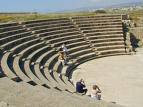 The angel said to John of Patmos, "This calls for a wise mind," which probably meant, "Here is a clue. It's up to you to connect the dots and reach a conclusion." The angel gives John of Patmos a hint about the seven Roman emperors or kings who rule Rome, the seven-hilled city. The seven Roman hills east of the River Tiber delineate Rome's geographical heart within the city walls. The names of the mounds are Palatine, Capitoline, Aventine, Caelian, Esquiline, Quirinal, and Viminal. John of Patmos deliberately calls the city "Babylon" to disguise it, but this concealment of Rome's name was familiar to many Jewish and Christians. ✞
The angel said to John of Patmos, "This calls for a wise mind," which probably meant, "Here is a clue. It's up to you to connect the dots and reach a conclusion." The angel gives John of Patmos a hint about the seven Roman emperors or kings who rule Rome, the seven-hilled city. The seven Roman hills east of the River Tiber delineate Rome's geographical heart within the city walls. The names of the mounds are Palatine, Capitoline, Aventine, Caelian, Esquiline, Quirinal, and Viminal. John of Patmos deliberately calls the city "Babylon" to disguise it, but this concealment of Rome's name was familiar to many Jewish and Christians. ✞
Roman Emperors' Cruelty
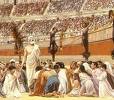 In Christianity's early centuries, the Roman Empire was particularly cruel to Christians through its emperors and officials. Many thousands of Christians died at Emperor Domitian's (51-96 AD) and Emperor Nero's (27-68 AD) hand. Believers were burned to death, sawn in half, skinned alive, impaled on wooden stakes, crucified, thrown to wild animals, and killed by gladiators for sport in the arenas and other public places. The Colosseum, the oval amphitheater in Rome's center, was the largest and most prominent Roman Empire theater. The Romans built smaller city versions across the empire, like Italy's Verona. They loved sports like British people love soccer, Americans love baseball, and Canadians love ice hockey! The games were the authorities' way of keeping order and entertaining the citizens. John of Patmos believes God will answer such cruelty towards Christians with equal ferocity. He tells of the Roman Empire's punishment as if it were a past event. ✞
In Christianity's early centuries, the Roman Empire was particularly cruel to Christians through its emperors and officials. Many thousands of Christians died at Emperor Domitian's (51-96 AD) and Emperor Nero's (27-68 AD) hand. Believers were burned to death, sawn in half, skinned alive, impaled on wooden stakes, crucified, thrown to wild animals, and killed by gladiators for sport in the arenas and other public places. The Colosseum, the oval amphitheater in Rome's center, was the largest and most prominent Roman Empire theater. The Romans built smaller city versions across the empire, like Italy's Verona. They loved sports like British people love soccer, Americans love baseball, and Canadians love ice hockey! The games were the authorities' way of keeping order and entertaining the citizens. John of Patmos believes God will answer such cruelty towards Christians with equal ferocity. He tells of the Roman Empire's punishment as if it were a past event. ✞
The Seven Heads
 "The seven heads equal the seven Roman Emperors." "Five have fallen, one at present exists, but the other has not yet come. When he does come, he must remain for a short time." The beast is himself the eighth Roman emperor, Domitian. He proceeds from the other seven. ✞
"The seven heads equal the seven Roman Emperors." "Five have fallen, one at present exists, but the other has not yet come. When he does come, he must remain for a short time." The beast is himself the eighth Roman emperor, Domitian. He proceeds from the other seven. ✞
Fallen Emperors
 The Roman Empire began with its founder Augustus (BC 63-14 AD.) The first five Roman Emperors were Augustus, Tiberius, Caligula, Claudius, and Nero. According to Revelation 17, these five kings all fell. After Nero's death, there were two chaotic years in which several minor leaders came and went in quick succession. Romans did not consider Galba, Otho, and Vitellius emperors. No list of emperors included them. The seven Roman emperors concluded with Vespasian and his son Titus. The "eighth emperor" and probably the cruelest was Domitian, called "the beast." ✞
The Roman Empire began with its founder Augustus (BC 63-14 AD.) The first five Roman Emperors were Augustus, Tiberius, Caligula, Claudius, and Nero. According to Revelation 17, these five kings all fell. After Nero's death, there were two chaotic years in which several minor leaders came and went in quick succession. Romans did not consider Galba, Otho, and Vitellius emperors. No list of emperors included them. The seven Roman emperors concluded with Vespasian and his son Titus. The "eighth emperor" and probably the cruelest was Domitian, called "the beast." ✞
Vespasian and Titus
 In this Revelation passage, "the other who has not yet come" is probably a reference to the Roman Emperor Vespasian (9-79 AD), who ruled for ten years until he died. He founded the Flavian dynasty, which lasted for 27 years. He was a renowned military leader spearheading Britain's Roman invasion in 43 AD and was the first emperor to bring back normality after the chaos following Emperor Nero's death. Revelation 17.10 says, "He must remain for only a little while." Vespasian's son Titus succeeded as the first-ever son inheriting his father's position as Roman Emperor. Titus' reign lasted only two years, from 79-81 AD. In 70 AD, Titus became famous for his successful siege and destruction of Jerusalem and the Temple as a general. The Arch of Titus stands in Rome today, generously decorated with carvings of his battle successes. He is also known for completing the massive Colosseum building in Rome. He also showed incredible generosity in relieving suffering after Mount Vesuvius's eruption in 79 AD and Rome's rebuilding after a terrible fire. ✞
In this Revelation passage, "the other who has not yet come" is probably a reference to the Roman Emperor Vespasian (9-79 AD), who ruled for ten years until he died. He founded the Flavian dynasty, which lasted for 27 years. He was a renowned military leader spearheading Britain's Roman invasion in 43 AD and was the first emperor to bring back normality after the chaos following Emperor Nero's death. Revelation 17.10 says, "He must remain for only a little while." Vespasian's son Titus succeeded as the first-ever son inheriting his father's position as Roman Emperor. Titus' reign lasted only two years, from 79-81 AD. In 70 AD, Titus became famous for his successful siege and destruction of Jerusalem and the Temple as a general. The Arch of Titus stands in Rome today, generously decorated with carvings of his battle successes. He is also known for completing the massive Colosseum building in Rome. He also showed incredible generosity in relieving suffering after Mount Vesuvius's eruption in 79 AD and Rome's rebuilding after a terrible fire. ✞
Nero Resurrected
 The emperor who followed Titus was Domitian (51-96 AD.) John of Patmos in Revelation 17.11 described Domitian as, "The beast who once was, and now is not, is the eighth king." The eighth proceeds from seven emperors and is on his way to destruction. According to "The Life of Domitian" by the Roman biographer Gaius Suetonius Tranquillus (c69-c120 AD), he was "Nero Redivivus" or "Nero Resurrected." Christians called Emperor Domitian "the Antichrist." There was a widespread belief that Nero didn't die but was resurrected and returned as Emperor Domitian! ✞
The emperor who followed Titus was Domitian (51-96 AD.) John of Patmos in Revelation 17.11 described Domitian as, "The beast who once was, and now is not, is the eighth king." The eighth proceeds from seven emperors and is on his way to destruction. According to "The Life of Domitian" by the Roman biographer Gaius Suetonius Tranquillus (c69-c120 AD), he was "Nero Redivivus" or "Nero Resurrected." Christians called Emperor Domitian "the Antichrist." There was a widespread belief that Nero didn't die but was resurrected and returned as Emperor Domitian! ✞
Mad Domitian
 Can Domitian be identified with the "Nero Redivivus" evil force? Domitian was certainly as evil. Suetonius, who was not a Christian sympathizer, asserts that all hated Domitian. A grim picture of him appeared at his reign's beginning. "He used to spend hours in seclusion every day, doing nothing but catching flies and stabbing them with a keenly-sharpened stylus." Any psychologist would find this a curiously revealing picture of any man or woman. He was insanely jealous and suspicious. Domitian revived the old and cruel punishment of stripping his victims naked, fixing them by the neck in a wooden fork, and beating them with rods until dead. ✞
Can Domitian be identified with the "Nero Redivivus" evil force? Domitian was certainly as evil. Suetonius, who was not a Christian sympathizer, asserts that all hated Domitian. A grim picture of him appeared at his reign's beginning. "He used to spend hours in seclusion every day, doing nothing but catching flies and stabbing them with a keenly-sharpened stylus." Any psychologist would find this a curiously revealing picture of any man or woman. He was insanely jealous and suspicious. Domitian revived the old and cruel punishment of stripping his victims naked, fixing them by the neck in a wooden fork, and beating them with rods until dead. ✞
Lucullan Lance
 The Roman Emperor Domitian claimed to be a god and insisted on being addressed as Lord and publically worshipped by all. His fifteen-year reign was a ruthless one. When the historian Hermogenes wrote unflattering things, Domitian executed him and the scribe who had copied his manuscript. Senators were slaughtered left and right. Gaius Suetonius Tranquillus (62-122 AD) informs us in "The Twelve Caesars" that the Governor of Britannia, Sallustius Lucullus, was executed in 89 AD. He allowed a new lance to be called a "Lucullan" after himself instead of Emperor Domitian. Suetonius' report says, "Domitian put to death Sallustius Lucullus, Governor of Britain, for allowing some lances of a new pattern to be called 'Lucullean,' after his name." "Lucullan" has strangely come to mean "extremely luxurious" and the name of a particular luxurious marble type. ✞
The Roman Emperor Domitian claimed to be a god and insisted on being addressed as Lord and publically worshipped by all. His fifteen-year reign was a ruthless one. When the historian Hermogenes wrote unflattering things, Domitian executed him and the scribe who had copied his manuscript. Senators were slaughtered left and right. Gaius Suetonius Tranquillus (62-122 AD) informs us in "The Twelve Caesars" that the Governor of Britannia, Sallustius Lucullus, was executed in 89 AD. He allowed a new lance to be called a "Lucullan" after himself instead of Emperor Domitian. Suetonius' report says, "Domitian put to death Sallustius Lucullus, Governor of Britain, for allowing some lances of a new pattern to be called 'Lucullean,' after his name." "Lucullan" has strangely come to mean "extremely luxurious" and the name of a particular luxurious marble type. ✞
Was Domitian a God?
 Early in his reign, Domitian appeared wearing a golden crown with Jupiter, Juno, and Minerva figures on it, while the priest of Jupiter sat beside him. When he received his divorced wife, he announced she had returned to the "divine couch." When he entered an arena, he loved to be greeted with the cry, "Good fortune, attend our lord and his lady." He began his official edicts, "Our Lord and God bid this done." "Lord and God" was soon the only title he would permit. He was a fierce and ruthlessly efficient autocratic leader. John of Patmos regarded him as the cruelest Roman Emperor. He lived in his father Vespasian's (9-79 AD) shadow until his father's death. His brother Titus (39-81 AD), a successful military leader, succeeded Vespasian until he developed a fatal illness in 81 AD. ✞
Early in his reign, Domitian appeared wearing a golden crown with Jupiter, Juno, and Minerva figures on it, while the priest of Jupiter sat beside him. When he received his divorced wife, he announced she had returned to the "divine couch." When he entered an arena, he loved to be greeted with the cry, "Good fortune, attend our lord and his lady." He began his official edicts, "Our Lord and God bid this done." "Lord and God" was soon the only title he would permit. He was a fierce and ruthlessly efficient autocratic leader. John of Patmos regarded him as the cruelest Roman Emperor. He lived in his father Vespasian's (9-79 AD) shadow until his father's death. His brother Titus (39-81 AD), a successful military leader, succeeded Vespasian until he developed a fatal illness in 81 AD. ✞
Cruel Suspicious Leader
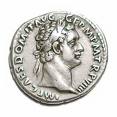 The day after Titus's death, the Praetorian Guard declared Domitian Emperor. The Roman historian Suetonius (69-140 AD), living in North Africa, wrote in his "Life of Domitian," "He was tall, with a modest expression and a high color. His eyes were large, but his sight was somewhat dim. He was handsome and graceful, especially when a young man, indeed in his whole body except for his feet, the toes of which were somewhat cramped. In later life, he became bald, with a protruding belly, and spindling legs, thin from a long illness." Though bald and wearing a wig, he was reputed to have written a book on hair care! He was, however, so suspicious and fearful that he had his prisoners chained during hearings. He had the passages tiled with reflective phengite mica stone during his lifetime. When polished, they were like mirrors, and Domitian could see anyone creeping up behind him. In the bloodiest circumstances, court officials murdered him on the 18th of September, 96 AD, despite all these precautions. He reigned for fifteen years longer than any Emperor since Tiberius. ✞
The day after Titus's death, the Praetorian Guard declared Domitian Emperor. The Roman historian Suetonius (69-140 AD), living in North Africa, wrote in his "Life of Domitian," "He was tall, with a modest expression and a high color. His eyes were large, but his sight was somewhat dim. He was handsome and graceful, especially when a young man, indeed in his whole body except for his feet, the toes of which were somewhat cramped. In later life, he became bald, with a protruding belly, and spindling legs, thin from a long illness." Though bald and wearing a wig, he was reputed to have written a book on hair care! He was, however, so suspicious and fearful that he had his prisoners chained during hearings. He had the passages tiled with reflective phengite mica stone during his lifetime. When polished, they were like mirrors, and Domitian could see anyone creeping up behind him. In the bloodiest circumstances, court officials murdered him on the 18th of September, 96 AD, despite all these precautions. He reigned for fifteen years longer than any Emperor since Tiberius. ✞
Nero reborn
 The early Christians thought Domitian was Nero resurrected or "Nero Redivivus," meaning "Nero Reborn." A popular legend surviving until the 5th century AD claimed that Nero did not die but fled Rome to raise an army and then return to destroy it. Domitian made Caesar worship compulsory during his reign as emperor and unleashed the flood-tides of Christian persecution. Many scholars believe that John of Patmos probably thought Domitian to be Nero's reincarnation. Secular and Christian leaders came to the same conclusion. Juvenal, a Roman poet of the 1st and 2nd century AD, stated that Rome was "enslaved to a bald Nero." For this remark, he was exiled and eventually murdered. Tertullian (160-220 AD), a 3rd century North African Christian leader, called Domitian "a man of Nero's type of cruelty" and a "sub-Nero." Eusebius (263-339 AD), the Roman historian and later Bishop of Caesarea, repeated this verdict. Domitian was, as we might say today, "a nasty piece of work!" ✞
The early Christians thought Domitian was Nero resurrected or "Nero Redivivus," meaning "Nero Reborn." A popular legend surviving until the 5th century AD claimed that Nero did not die but fled Rome to raise an army and then return to destroy it. Domitian made Caesar worship compulsory during his reign as emperor and unleashed the flood-tides of Christian persecution. Many scholars believe that John of Patmos probably thought Domitian to be Nero's reincarnation. Secular and Christian leaders came to the same conclusion. Juvenal, a Roman poet of the 1st and 2nd century AD, stated that Rome was "enslaved to a bald Nero." For this remark, he was exiled and eventually murdered. Tertullian (160-220 AD), a 3rd century North African Christian leader, called Domitian "a man of Nero's type of cruelty" and a "sub-Nero." Eusebius (263-339 AD), the Roman historian and later Bishop of Caesarea, repeated this verdict. Domitian was, as we might say today, "a nasty piece of work!" ✞
Revelation Lamb
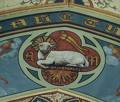 In Heaven, the beast during Emperor Domitian's rule and the Antichrist war with the Revelation Lamb, but he destroys their power. John of Patmos may have been dictated Revelation and thought back to Vespasian's era to describe the last terrible times. In Domitian, he probably saw Rome's supreme wickedness, defiance against God, and Nero's reincarnation. Therefore, he identified Domitian as the Antichrist, who battles with the Revelation Lamb. The ten horns refer to the ten kings who have not received their power. They would receive it, and they would unanimously agree to hand their power to the beast when they did. They would rise with the harlot and make war with the Revelation Lamb, who would finally defeat him. The called and chosen share in the Lamb's victory. The saints and the martyrs will one day share in God's final triumph. ✞
In Heaven, the beast during Emperor Domitian's rule and the Antichrist war with the Revelation Lamb, but he destroys their power. John of Patmos may have been dictated Revelation and thought back to Vespasian's era to describe the last terrible times. In Domitian, he probably saw Rome's supreme wickedness, defiance against God, and Nero's reincarnation. Therefore, he identified Domitian as the Antichrist, who battles with the Revelation Lamb. The ten horns refer to the ten kings who have not received their power. They would receive it, and they would unanimously agree to hand their power to the beast when they did. They would rise with the harlot and make war with the Revelation Lamb, who would finally defeat him. The called and chosen share in the Lamb's victory. The saints and the martyrs will one day share in God's final triumph. ✞
Faithful Followers Suffer
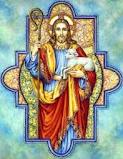 The apocryphal Book of Solomon's Wisdom from the first century AD contains the same promise to those who have lived, suffered, and died for God. It is a commentary on Christian persecution and has nothing to do with King Solomon. The Wisdom of Solomon 3.5-8 comforts persecuted and faithful followers, "Having borne a little chastening, they shall receive great good because God tried them and found them worthy of himself." "As gold in the furnace, he proved them, and as a whole burnt offering, he accepted them. They shall shine forth, and as sparks among the stubble, they shall run to and fro. They shall judge nations and have dominion over people." The Revelation Lamb, because he is Lord of Lords and King of Kings, overcomes his enemies. This belief is perhaps in James and John's minds in Matthew 20.20-21 "Then the mother of Zebedee's sons came to Jesus with her sons and, kneeling, asked a favor of him. 'What is it you want?' he asked. She said, 'Grant that one of my two sons may sit at your right and one at your left in your kingdom.'" James and John came and asked Jesus to be number two and three in authority! Many leaders today, even in the church, strive to control the Kingdom of God. The reality is that the lowliest and humblest will occupy these positions, not the strongest and most dominant! ✞
The apocryphal Book of Solomon's Wisdom from the first century AD contains the same promise to those who have lived, suffered, and died for God. It is a commentary on Christian persecution and has nothing to do with King Solomon. The Wisdom of Solomon 3.5-8 comforts persecuted and faithful followers, "Having borne a little chastening, they shall receive great good because God tried them and found them worthy of himself." "As gold in the furnace, he proved them, and as a whole burnt offering, he accepted them. They shall shine forth, and as sparks among the stubble, they shall run to and fro. They shall judge nations and have dominion over people." The Revelation Lamb, because he is Lord of Lords and King of Kings, overcomes his enemies. This belief is perhaps in James and John's minds in Matthew 20.20-21 "Then the mother of Zebedee's sons came to Jesus with her sons and, kneeling, asked a favor of him. 'What is it you want?' he asked. She said, 'Grant that one of my two sons may sit at your right and one at your left in your kingdom.'" James and John came and asked Jesus to be number two and three in authority! Many leaders today, even in the church, strive to control the Kingdom of God. The reality is that the lowliest and humblest will occupy these positions, not the strongest and most dominant! ✞
"Seven Roman Emperors"
by Ron Meacock © 2021
| ^Top Page | Next | Previous |